I did an email interview this morning. By the way, you can find all of my email interview online, if you’re interested.

Q 168. I’m back, Rudy, I interviewed you twenty months ago for my art magazine, Ylem: Journal of Artists Using Science and Technology, and I’m getting ready to publish our interview. I want to bring it up to date with some follow-up questions. What became of that nonfiction book you were talking about, The Lifebox, the Seashell, and the Soul?

A 168. The Lifebox came out last month to my customary blizzard of zero publicity, other than the web page I made for it. It’s a very nice-looking well-produced book with lots of great illos, and I said everything I wanted to about the meaning of computation. But I’m not seeing any reviews of it, other than in the three publishing trade-zines. And, sigh, Amazon posted the one bad review on their page. And I haven’t seen it for sale in many stores. And the science-book-clubs haven't yet picked it up. And we haven't gotten any deals from foreign publishers. So right now I’m discouraged.
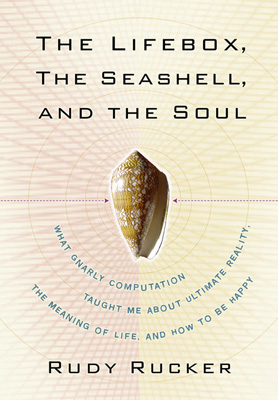
I have a sense that the market for science books these days is geared towards books having precisely one idea, which is then buttressed with water-cooler-level discussions of pre-digested news stories that have been fed to us by the media. The recent best-seller Blink is a self-reflexive example of this: Blink says that your very first and most shallow idea on any topic is correct. You don’t even have to read it! Just put it on your shelf. Got it. Like a white-on-white painting with maybe one red dot. No time wasted. And I’m also up against Ray Kurzweil’s snake-oil-sales-pitch The Singularity is Near, which pretty much says, “Buy my book and you’ll live forever.” The guy even sells vitamins.

The Lifebox, the Seashell, and the Soul: What Gnarly Computation Taught Me About Ultimate Reality, the Meaning of Life, and How to Be Happy is ruminative and dialectic in approach; I weigh opposing views of reality and come up with a synthesis or, if that’s not possible, consider holding both views simultaneously. Also I commit the high crime of joking around rather than being deadly serious.

The title itself is a dialectic triad, by the way. The Lifebox thesis is that there can be computer models of human minds, the Soul antithesis is that I feel myself to be a vibrant energy-filled being and not a machine, the Seashell synthesis is that the computational patterns found on cone shells are examples of the gnarly deterministic-but-unpredictable computations that could indeed inhabit my skull.
My book is profound and deeply human, but it’s not very blink at all. Stephen Wolfram likes it in any case; he says it’s more important book than my publishers or I realize.

Q 169. And you said that after the Lifebox book you were going to write a novel about two crazy mathematicians?
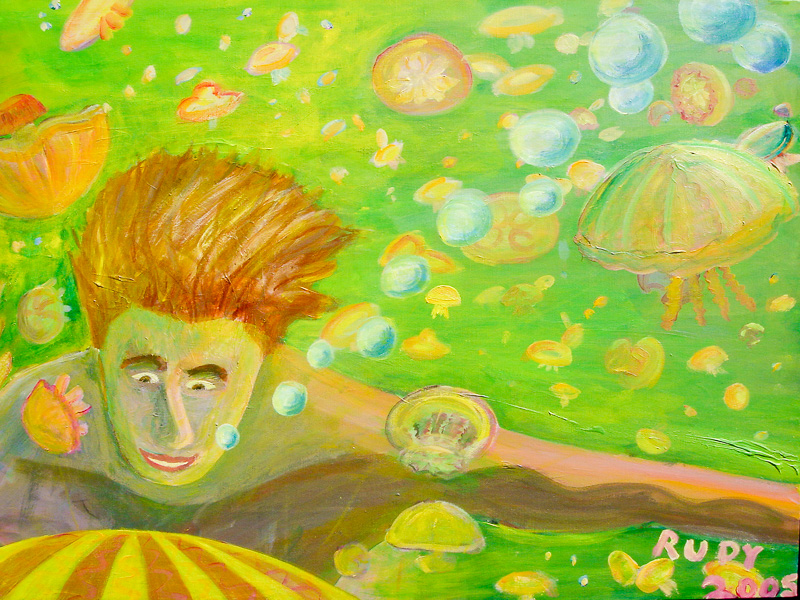
A 169. Yes, Mathematicians in Love. I just finished making the final revisions. It’ll be out from Tor Books in, I suppose, summer or fall of 2006.
I had fun with this novel. For one thing, it gives sfictional life to some of the ideas in my Lifebox tome. For instance I have my two guys making universal paracomputers out of naturally occurring things like vibrating drumheads. Now, in Lifebox I argued that most naturally occurring processes are, although deterministic, impossible to effectively predict by dint of being gnarly computations. But, just for kicks, I set most of Mathematicians in Love in a world where this isn’t the case, and it is actually possible to build a device that predicts the weather, the stock market, other people’s decisions and so on.

Another thing I do in Mathematicians in Love is to satirize our current government, and to have my characters bring it crashing down. President Joe Doakes goes to jail. I found that very satisfying.
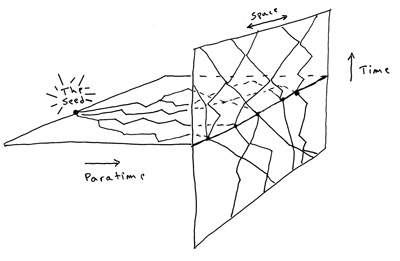
Yet another angle is that I use a notion about parallel worlds which I developed in The Lifebox, the Seashell, and the Soul; my idea is that reality might be a series of parallel universe which are linearly ordered, with each one slightly better than the one before, like successive drafts of a novel.
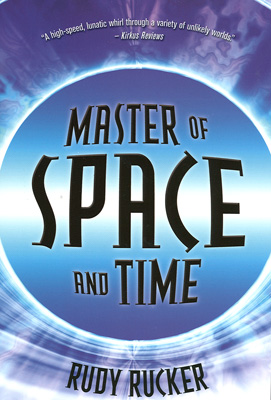
One thing that would pep up my career would be if Michel “The Eternal Sunshine of the Spotless Mind” Gondry actually makes his movie of my novel Master of Space and Time. He’s had the option for two years and is presently working on a script with Dan “Ghost World” Clowes. Michel says he’d like to cast Jim Carrey and Jack Black as the book’s two mad scientist pals. (I know, I already mentioned this on the blog, but hey, this thought is my current security blanket.)

Q 170. What’s next?
A 170. I’m not sure. I’m not up for another big project yet, what with my would-be-earthshaking tome being ignored, and with the long haul of my latest novel just ended. Call it post-partum blues.

Right now I’m writing some short stories. With a couple more, I’ll have enough for a new story anthology. So that’d be an easy book to get out. This summer I read Charles Stross’s great Accelerando, and that got me interested in tackling the Singularity head on; I’m writing two stories about the Singularity right now, and I already sold one of them to Asimov’s.
I’ve been cleaning out my basement this week and putting all my old boxes of papers in one specified corner. Maybe that means I’m getting ready to write a memoir. I’d sort of like to take on that project, but the publishers I’ve mentioned it to aren’t very interested. I also have a few hundred thousand words of journals that could perhaps be published in some form.
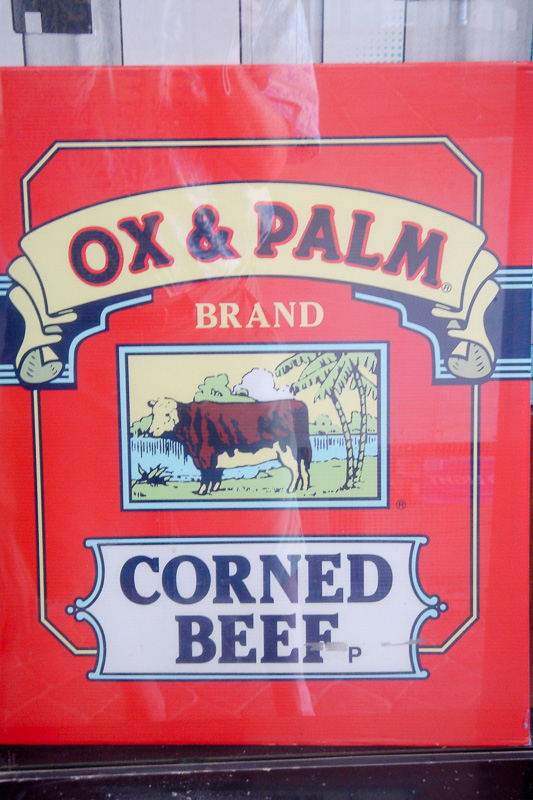
The other possibility is, of course, that I write a new novel. I’d been thinking of doing a sequel to Frek and the Elixir, but I don’t have a killer idea for that yet. For Frek itself, I used Campbell’s monomyth structure, one stage per chapter, which gave the book a nice form, but it sort of makes the book a finished whole, so I’m not exactly sure how to do a sequel. Or I could do a fifth Ware book, not that the first four are flying off the shelves anymore.
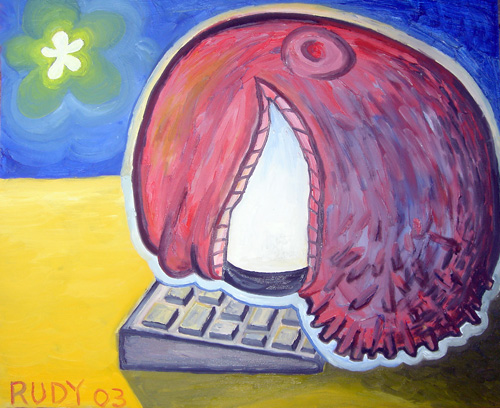
Another thought is to drop writing for awhile, and wait for the world to catch up with me. I enjoy painting; maybe I could pick up a few bucks doing that. One result of cleaning out the basement is that I’ll have room for a metal rack on which to store all of my family’s accumulated paintings — we’re all artists. With a place to store the accumulated works, I’d be a step closer to painting a bit more. One thing I might do soon is to start selling posters of my paintings on the web. That’d be more painless than trying to get a show.

I piss away a lot time blogging. On the one hand, it's an obsessive-compusive disorder, and I think I'll be cutting down to one blog post per week so as to have more time. But I do see blogging as an art form; I like for each entry to be a nicely balanced combintation of words and pictures — I shoot a lot of pictures with my digital camera, and I recycle old ones, like I'm doing today. I’ve even gotten into podcasting, that is, posting my lectures and spoken interviews online. In my own diffuse and unpredictable fashion, I seem to be creating an electronic lifebox copy of my mind. On the third hand, why bother? Better to go outside and ride my bike.









November 9th, 2005 at 11:09 am
You sound discouraged, Rudy. Shame on ya.
I bought your book (Lifebox…) and enjoyed it. Maybe it didn’t change my world – but on the other hand I think it did bring me closer to … clouds, grass straws, the wind blowing on my face (no mean feat) – and it is nice to know (for a psychologist anyway) that there is a “sorta” mathematical proof for that you don’t really know what is going to happen next (or even if it will happen …ever). No quick fixes.
I liked your five/six points for “happiness” at the end of the book. They don’t work of course, but that is just what the book has proven.
So a nice, kind book. Recommended as it explains why the earth probably won’t move after you have bought it.
After reading it I thought – must be easy being a computer scientist, a few weighty ideas powerful in iteration – whilst a psychologist has no answers whatsoever.
So .. enjoy letting the world do some of the “work”, Rudy. Regards.
November 9th, 2005 at 12:42 pm
Thanks, Marshall. Yes, let the world do some of the work, thanks for reminding me.
Pausing from cleaning the basement and reading an old math magazine just now, I was lead to a physics abstract, which I don’t understand, with nice buzzwords. Makes me want to write SF…
We study the boundary states of D-branes wrapped around supersymmetric cycles in a general Calabi-Yau manifold. In particular, we show how the geometric data on the cycles are encoded in the boundary states. As an application, we analyze how the mirror symmetry transforms D-branes, and we verify that it is consistent with the conjectured periodicity and the monodromy of the Ramond-Ramond field configuration on a Calabi-Yau manifold. This also enables us to study open string worldsheet instanton corrections and relate them to closed string instanton counting. The cases when the mirror symmetry is realized as T-duality are also discussed.
Can anyone tell me what an “instanton” is?
November 9th, 2005 at 3:14 pm
Hey Rudy,
I must say I have never heard of you before and stumbled accross your book somehow (Lifebox), and it was quite an eye opener. It put together a lot of loose threads in my head, and some of the ideas presented fascinate me, Im still mulling them over in my mind a month or so after reading it, with the occasional ‘aaaah’ of insight or weird thought. I really like the idea of paratime.
Thanks for the conscience expanding experience.
Jack
Pimping your book in the UK.
November 9th, 2005 at 11:47 pm
Hm, as far as blogging goes, maybe you should direct more effort toward quality per time than quality per post? I understand that there’s a satisfaction in having them nicely structured and full of pictures and stuff, but you’ve got to strike some kind of balance.
Why not go with the flow a little more? If you have a cool idea, post it, same for a cool picture, or story, or anything. Blogs are meant to cater to that sort of immediacy. I can’t speak for the other readers of your blog, but I’m more interested in what you have to say than the perfection of its composition.
If you were to look back on a quickly posted entry of a trivial idea or anecdote at some later date, would you really criticize it? I’m inclined to think you’d just be happy to rediscover an experience otherwise lost to time.
Oh man, this is getting long…
As far as being glum about Lifebox:
I have to confess, I haven’t bought it. I did read all of the parts you have available online, and I either will buy it, or put it on my wishlist for the holidays (poor student with a family who like to give books…).
What I read, I really liked. I’ve also really enjoyed the podcasts of lectures you’ve posted so far. I’ve even followed along in CELLAB and CAPOW, in addition to the hours I’ve spent using them (and CHAOS) otherwise. I think I could have done pretty well on your midterm, and I go to Carleton U in Ottawa ON, not SJSU. I see Zhabotinski scrolls in my coffee, fractals in the trees, and gnarly equilibrium on the dirt path to the train.
What I’m trying to illustrate here is that you’re doing yourself a disservice when you say ‘would-be-earthshattering tome’.
It blew my mind, which I’m sure wasn’t the first, and won’t be the last.
As for Kurzweil etc don’t let him and his book get you down. How can you compete with ‘your immortality and flying car are right around the corner’? Why should you try (even in your head, if not with your book)? I think that you have accomplished with your book something far more difficult and noteworthy than he has even attempted with his. It’s easy to be dismayed that people are so easily pandered to, but there’s no point, and it’ll never change.
Instead you should relax, and be proud of your accomplishment, content in the knowledge that he’s just telling people what they want to hear.
Sorry for the longwindedness.
Take it easy, and keep it gnarly.
-b
November 10th, 2005 at 11:57 am
I really like the structure of your blog entries; excellent writing, and pictures that reflect what’s being said. It’s one of the few things I read regularly that almost always makes me smile.
November 10th, 2005 at 6:42 pm
Your Memoir is something I would like to read. Why not self-publish it?
Also the paintings as posters, put me down for a Dan ha duc, plus I’ll have a Stun City as well.
Just got Lifebox from Amazon yesterday.
November 12th, 2005 at 7:51 am
hey rudy, sorry I have not been able to make it to class. I got caught up trying to get something out the door last thrusday and did not make it to the debate. I’m sitting here listing to your lecture at MIT and catching up to your blog at the same time. I agree blogging is a time sucker! But that is nothing compared to the time suck of reading other people’s blogs:-)
I was telling someone about the class, your book and other your writing early this week and the thing I said (which I think is fair) in contrasting your work other SF authors who might be more popular, that your writing is smooth as opposed to edgy. These days only edgy gets attention. I think people that want to reflect more deeply are attracted to your work, but most people just want to be poked — a sharp pain that goes away quickly is often better dull pain that persists. [This is all just metaphor so please consider it in that way.] For myself I like both!
I enjoyed your ruminations here, more revealing of the inner rudy than most of you entries. Anyway, I’m behind in work for work and class, so I should be doing something else:-)